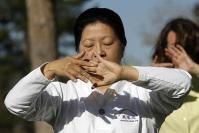The Salt Lake Tribune: Working toward tranquility (excerpts) (Photos)
April 13, 2007

Lin Chu says Falun exercises cured her carpal tunnel syndrome.
On a recent Saturday morning, seven people stood in a circle at Salt Lake City's Liberty Park, lifting and lowering their hands in ballet-like swoops and swooshes while a taped voice calmly repeated instructions in Chinese. Their slow, graceful movements were in sync with the haunting music and each other, yet the participants seemed to exist separately, inhabiting different time and space.
Breathing, lifting, gliding, they believe they are working toward tranquility and divine power, healing their bodies and clearing their minds.
They are following the principles of Falun Gong, which means "practice of the wheel of the dharma." It is not a religion, nor even an organized group. There is no clergy, no tithes and offerings and no membership requirements.
Watching these gentle practitioners stretch and meditate in the sunlight, it is hard to see why Chinese officials outlawed the group in 1999 and arrested and tortured its adherents.
Based on ancient Chinese teachings about energy, healing and the mind, Falun Gong was passed down from teachers to individual students until Master Li Hongzhi reintroduced these ideas to the public in 1992.
It brings together ideas about chi, or life's basic energy, and elements common to Taoism, Confucianism and Buddhism.
Basically, the teachings include five exercises - four standing and one sitting - designed to cultivate the body, mind and spirit. They tap and develop each person's "Law Wheel," a high-energy entity spinning inside one's lower abdomen.
[...]
In the past 15 years, Falun Gong has attracted literally millions of followers - by some estimates, as many as 100 million - to its teachings about truthfulness, compassion and forbearance.
After searching and trying many different spiritual traditions, Beverly Clark still had questions. She read about Falun Gong, then ordered the faith's sacred texts: Zhuan Falun and China Falun Gong. She was hooked.
"The more I study it, the more beautiful I think it is," says Clark, who practices in the park.
For years, Jack Luo suffered painful mouth and tongue sores. He went to conventional doctors in China, then emigrated to the U.S. and tried its medical system. Nothing worked. He was angry and miserable. Within a month of doing Falun Gong exercises, he was cured, he says.
Falun exercises helped Patrice Luong cope with the death of her sister and father. The exercises also cured Lin Chu's carpal tunnel syndrome.
And so it goes.
Each of these practitioners has a story of dramatic change, healing and awakening. They say they are more compassionate, more tolerant, less angry.
Yet the Chinese government has declared the peace-loving practitioners of Falun Gong a [slanderous term omitted -- ed.] [...] and outlawed the practice. [...]
Followers have staged mass demonstrations across the globe from Beijing to Berlin, Seattle to Sydney. They've appealed to the United Nations, the U.S. government and the public to protect their rights and condemn the abuses. Some 400 protesters made their case in Salt Lake City during the 2002 Winter Olympic Games, calling the Olympic spirit of global unity a complement to the movement's philosophy.
Last year human rights activists accused China of harvesting organs from live Falun Gong prisoners and then destroying their remains.
"Spirituality is always a threat to the Communists," says Luo, a restaurant owner in Heber who was a policeman in China. "The government is only one party. They control everybody, promote one mind on TV, in newspapers and schoolbooks. People are afraid."
The government is afraid of losing control, he says, because there are more Falun Gong practitioners than Communist Party members. [Editor's note: Falun Gong has no interest in politics and seeks no political power.]
[...]
Ironically, it was opposition to Communism that attracted Luong to Falun Gong. She had escaped Communist rule in Vietnam as a child, as one of the "boat people." After spending some time in a refugee camp, she and her family were assigned to Utah, where she has lived since.
So when Luong saw critiques of Falun Gong on Chinese television in 2000, she didn't believe it. She immediately sent away for the instruction books and began to practice its exercises.
"I read the book and said 'wow.' It teaches me so many things I never understood," says Luong, a Utah exercise leader. "I learned to get rid of competition and jealousy. Before I was too attached to job and boys and perfection. Now I take it more lightly."